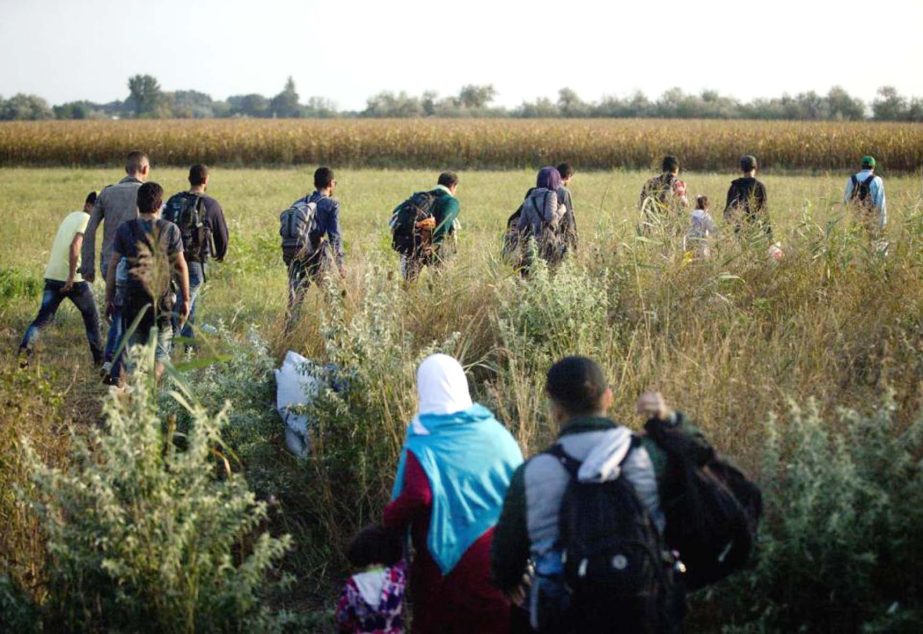
Reuters, Amsterdam :
As Europe grapples with its biggest wave of migration since World War Two, the Netherlands is about to toughen its asylum policy by cutting off food and shelter for people who fail to qualify as refugees.
Failed asylum seekers would be limited to “a few weeks'” shelter after being turned down, if they do not agree to return home. They would then either be deported or sent away to fend for themselves.
From November, the center-right coalition of Prime Minister Mark Rutte, which competes for votes with the popular, anti-immigration party of Geert Wilders, wants to close 30 regional “bed, bath and bread” shelters where asylum seekers have been able till now to get help on the basis of need.
Under the plan, six national centers applying the stricter guidelines would provide only to people who agree to leave.
The proposal prompted a clash between Rutte’s ruling right-wing Liberals and their junior coalition partner, Labour, that nearly toppled the government in April.
On Friday, the U.N.’s Committee on the Elimination of Racial Discrimination added to outside criticism of the Dutch policy, saying basic needs of migrants should be provided unconditionally.
“As long as they are in the Netherlands, they have to enjoy minimum standards of living,” said Ion Diaconu, who helped write the U.N. report.
But Rutte responded on Friday that it would be “crazy” to offer permanent shelter to people who refused to leave. “We are talking about the group that can go back, whose governments would take them back, but they don’t want to go back,” he said.
Local governments now operating the sites with national funding, are challenging the move in the courts, fearing it will lead to a surge in homelessness if they are obliged to close shelters in November. Some mayors have refused, saying they will seek alternative funding.
A complaint was lodged with the 47-nation Council of Europe, the continent’s leading human rights forum, which admonished the Netherlands last year for placing asylum seekers in administrative detention and leaving many “irregular immigrants” in legal limbo and destitution.
Meanwhile, the top security officials of Germany, France and Britain are pressing for better processing of migrants arriving in southern Europe and for a European Union-wide list of countries considered safe.
German Interior Minister Thomas de Maiziere, France’s Bernard Cazeneuve and Britain’s Theresa May issued a statement Sunday after consulting in Paris the previous day. They stressed the need to set up “hot spots” in Greece and Italy by the year’s end to ensure migrants are fingerprinted and registered, allowing authorities to identify quickly those in need of protection.
Germany, which has seen many asylum requests this year from Balkan countries, is keen to identify “safe” countries to ease returning rejected asylum applicants.
The officials urged holding a special meeting of EU interior and justice ministers in the next two weeks.
As Europe grapples with its biggest wave of migration since World War Two, the Netherlands is about to toughen its asylum policy by cutting off food and shelter for people who fail to qualify as refugees.
Failed asylum seekers would be limited to “a few weeks'” shelter after being turned down, if they do not agree to return home. They would then either be deported or sent away to fend for themselves.
From November, the center-right coalition of Prime Minister Mark Rutte, which competes for votes with the popular, anti-immigration party of Geert Wilders, wants to close 30 regional “bed, bath and bread” shelters where asylum seekers have been able till now to get help on the basis of need.
Under the plan, six national centers applying the stricter guidelines would provide only to people who agree to leave.
The proposal prompted a clash between Rutte’s ruling right-wing Liberals and their junior coalition partner, Labour, that nearly toppled the government in April.
On Friday, the U.N.’s Committee on the Elimination of Racial Discrimination added to outside criticism of the Dutch policy, saying basic needs of migrants should be provided unconditionally.
“As long as they are in the Netherlands, they have to enjoy minimum standards of living,” said Ion Diaconu, who helped write the U.N. report.
But Rutte responded on Friday that it would be “crazy” to offer permanent shelter to people who refused to leave. “We are talking about the group that can go back, whose governments would take them back, but they don’t want to go back,” he said.
Local governments now operating the sites with national funding, are challenging the move in the courts, fearing it will lead to a surge in homelessness if they are obliged to close shelters in November. Some mayors have refused, saying they will seek alternative funding.
A complaint was lodged with the 47-nation Council of Europe, the continent’s leading human rights forum, which admonished the Netherlands last year for placing asylum seekers in administrative detention and leaving many “irregular immigrants” in legal limbo and destitution.
Meanwhile, the top security officials of Germany, France and Britain are pressing for better processing of migrants arriving in southern Europe and for a European Union-wide list of countries considered safe.
German Interior Minister Thomas de Maiziere, France’s Bernard Cazeneuve and Britain’s Theresa May issued a statement Sunday after consulting in Paris the previous day. They stressed the need to set up “hot spots” in Greece and Italy by the year’s end to ensure migrants are fingerprinted and registered, allowing authorities to identify quickly those in need of protection.
Germany, which has seen many asylum requests this year from Balkan countries, is keen to identify “safe” countries to ease returning rejected asylum applicants.
The officials urged holding a special meeting of EU interior and justice ministers in the next two weeks.

